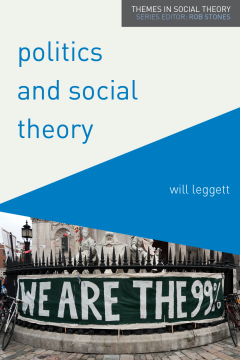
Additional Information
Book Details
Abstract
Under present social conditions, neither social theorists nor political scientists can afford to ignore one another. This book is a clear, structured account of the relationship between politics and social theory, examining both the political content of social theory, and how social theory has illuminated our understanding of politics.
WILL LEGGETT is Senior Lecturer in Sociology in the School of Government and Society, University of Birmingham, UK and author of After New Labour: Social Theory and Centre-Left Politics. He researches and teaches in the fields of political sociology and social and political theory, and has particular interests in the relationship between social change, ideology and political identities and action. More recently he has focused on the rise of 'behaviour change' as a political objective: his 'The politics of behaviour change: nudge, neoliberalism and the state', won the 2015 Ken Young Prize for the best article in the journal Policy & Politics.
Table of Contents
| Section Title | Page | Action | Price |
|---|---|---|---|
| Cover | Cover | ||
| Contents | vii | ||
| Series Foreword | ix | ||
| Preface and Acknowledgements | xv | ||
| Introduction | 1 | ||
| Social theory and political analysis: Suspicious neighbours? | 1 | ||
| The theoretical argument and contribution | 2 | ||
| The structure of the book, and how to read it | 3 | ||
| Definitions and boundaries | 4 | ||
| 1 The Society–Politics Relation: On the Inescapably Social and the Irreducibly Political | 11 | ||
| Introduction | 11 | ||
| The irreducible nature of politics | 12 | ||
| The inescapable fact of the social | 18 | ||
| The empirical interplay between the social and the political | 21 | ||
| Critique, social theory and political analysis | 24 | ||
| 2 Politics From Above: The State and Governance | 30 | ||
| Introduction | 30 | ||
| Social theory, state and civil society | 32 | ||
| Contemporary social theory and governance | 44 | ||
| Case study 1: An active state in a changing world – the Third Way | 48 | ||
| Case study 2: Citizens as co-governors: culture governors, expert citizens and everyday makers | 51 | ||
| Reading the state and governance through social theory | 54 | ||
| Conclusion: The state, governance and the society–politics relation | 58 | ||
| 3 Politics From Below: Political Identity and Participation | 61 | ||
| Introduction | 61 | ||
| Classical social theory and the Self | 63 | ||
| From stable Selves to fluid identities | 70 | ||
| Case study: Political consumerism | 84 | ||
| Reading political consumerism through social theory | 93 | ||
| Conclusion: Political identity, participation and the society–politics relation | 97 | ||
| 4 Politics All Around: Culture, Ideology and Discourse | 103 | ||
| Introduction | 103 | ||
| Theorising culture, ideology and discourse | 105 | ||
| Case study: The hegemony of neoliberalism | 125 | ||
| Reading neoliberalism through social theory | 132 | ||
| Social theory and its empirical object: The challenge of neoliberalism | 140 | ||
| Conclusion: Ideology, discourse and the society–politics relation | 143 | ||
| Conclusion | 149 | ||
| Restating the theoretical argument | 149 | ||
| Summarising the substantive chapters | 150 | ||
| Sociology, political science and a (post-?)neoliberal world | 156 | ||
| Bibliography | 158 | ||
| Index | 176 |
